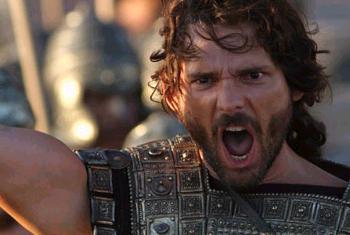The name Achilles still echoes of heroism thousands of years after Homer celebrated him in “The Illiad”, so it’s no surprise to find Brad Pitt looking spectacular and pulling all kinds of astonishing feats. What’s more unexpected (and interesting) is to have the legendary warlord reveal his flaws. The Achilles we see here is rather selfish and vain, a “man born to end lives”, more concerned with his own glory than with the good of his country. He’s “haunted by the vastness of eternity”, hence he throws himself into adventure and danger in hope of achieving immortality through his reputation.
We first see Achilles as a boy barges into the hut in which he’s lying naked with two women to fetch him to the battlefield, where he’s eagerly expected by King Agamemnon (Brian Cox) and his army. Such a display initially seems self-indulgent, but once you get a handle of Agamemnon’s character it’s easy to see why Achilles is reluctant to serve him blindly. Agamemnon is a greedy and uncompassionate prick of a ruler ever hungry for more land and power. Brian Cox is monumental as always in the role, squeezing every unsavory drop of arrogance and sleaze out of every moment.
Agamemnon wants Greece to go to war with Troy, but it doesn’t seem to be in the air. In fact, his brother and King of Sparta Menelaus (Brendan Gleeson) is in peace talks with Trojan princes Paris (Orlando Bloom) and Hector (Eric Bana). Yet when Paris falls desperately in love with Menelaus’s pretty young wife Helen (Diane Kruger) and woos her back to Troy, tempers explode and a thousand ships are launched after her to start a big fat Greek war…
This 21st century peplum was directed by Wolfgang Petersen, clearly taking a few pointers from Ridley Scott’s Gladiator but coming up with a film more complex and epic, if not quite as involving on a personal level. “Troy” looks awesome, with its sun-drenched battlefields and turquoise seas, a re-created ancient city and hundreds of extras in shiny armors, James Horner’s brassy score never fails to get your adrenaline pumping and it’s got a great cast that makes this 2,800 year-old tale feel urgent and actual.
I’m quite the Greek mythology geek, having devoured these stories as a kid. While the gods never make an appearance on screen, their influence can be felt in every heroic action and every wicked twist of fate. Achilles is disdainful of them, going as far as to behead a statue of Apollo, but how can he explain his extraordinary prowess if not as a godly gift? Then again, Troy King Priam (Peter O’Toole) is deeply pious yet all he’ll get is defeat and sorrow.
The film is full of such ironies and ambiguities. There are hardly any good or bad guys here. Oh, Priam is clearly wiser than Agamemnon, but initially at least we understand the Greeks’ desire to reclaim their queen. Then again, while it is foolish of Paris to steal another man’s wife, Helen is more than willing and, in any case, Agamemnon is just using this affront as an excuse to get his war. It’s like the Bush administration pretending that they invaded Iraq because of 9/11 and not out of greed. Except that Troy does have weapons of mass destruction (Fireballs!) and someone has the good sense of pointing out that “even enemies can show respect.” They should tell that to the American soldiers guarding Iraqi prisoners. /end of political tangent
“Troy” is a testosterone-fueled epic with some homoerotic undertones, especially between Achilles and his young cousin, but that’s to be expected when you have dudes in skirts running around ancient Greece! Still, women are central to the picture. There’s Helen, of course, whose “face that launched a thousand ships” belongs to drop dead gorgeous German actress Diane Kruger, and Briseis, a royal priestess played by Rose Byrne. She’s captured by the Greeks early on and saved from becoming “spoils of war” by Achilles, who develops an impossible, unhealthy but ultimately moving romance with her. “You gave me peace in a lifetime of war.”
Achilles might get the most screen time, but to me the most sympathetic character in the film is Hector, played with smoldering intensity by Eric Bana. Hector is a family man who hates war, but he loves his brother and his country and he’s willing to die for them. You can feel this inner turmoil in every of Bana’s scenes, how he goes around killing people because he has to but finds no pleasure in it. This is quite refreshing, how violence is not glorified as in most big summer action flicks. The confrontation between Menelaus and Paris, for instance, is particularly painful and unglamorous, with the large and pissed off Spartan King towering over the wimpy Prince of Troy.
Unsurprisingly, the highlight is the Achilles-Hector match-up, an instant classic. That fight is so good that one wonders, “Where do you go from there?” Can the film top this? Not quite, but the last act is still memorable, with its introduction of the infamous Trojan Horse. It’s an iconic sight, but one that should inspire dread instead of admiration. It’s a dirty trick, played against a nation that deserved better, which makes for a bleak finish. There can be no happy end to this story; like in all wars there are no winners, just survivors.

